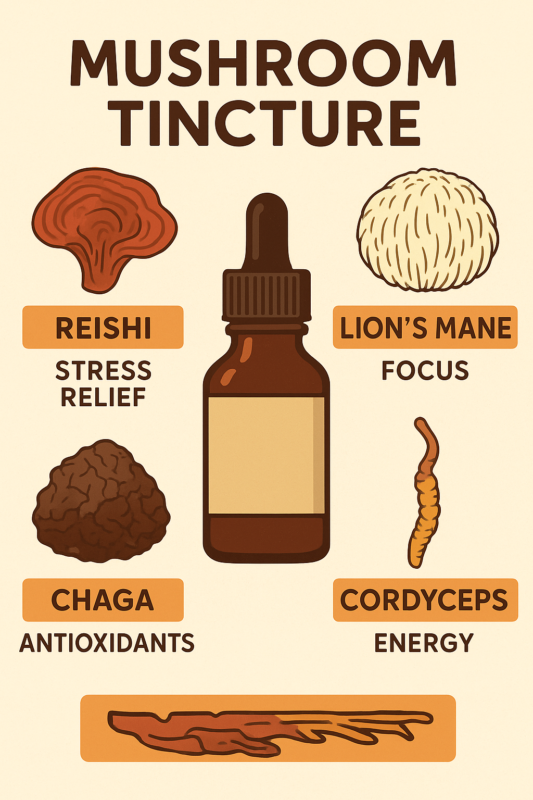
The Ultimate Guide to Mushroom Tincture: Benefits, Uses, and Expert Insights
Introduction: What is a Mushroom Tincture?
In the world of natural wellness, few remedies are gaining popularity as quickly as the mushroom tincture. For centuries, mushrooms have been used in traditional medicine across cultures—from ancient Chinese practices with reishi and cordyceps to indigenous use of chaga and turkey tail.
A mushroom tincture is a concentrated liquid extract made by soaking medicinal mushrooms in alcohol (and sometimes water) to draw out their bioactive compounds. Think of it as the easiest, most potent way to access the healing properties of mushrooms in just a few drops.
As an industry expert in herbal medicine and natural supplements, I’ll walk you through everything you need to know about mushroom tinctures: what they are, how they’re made, their benefits, and how to incorporate them into your daily life.
How is Mushroom Tincture Made?
The Dual Extraction Process
Most high-quality mushroom tinctures are made through dual extraction:
- Alcohol Extraction – Alcohol pulls out fat-soluble compounds like triterpenes, which support immunity and reduce inflammation.
- Hot Water Extraction – Water extracts polysaccharides such as beta-glucans, known for their immune-boosting properties.
The result? A balanced tincture that captures the full spectrum of a mushroom’s health benefits.
Why Tinctures Instead of Powders or Capsules?
- Higher potency – Tinctures are concentrated.
- Better absorption – Liquid extracts are absorbed faster than capsules.
- Convenience – Easy to add to coffee, tea, smoothies, or directly under the tongue.
Popular Types of Mushroom Tincture
Not all mushroom tinctures are the same. Different mushrooms support different aspects of health. Here are some of the most common and powerful varieties:
- Reishi Mushroom Tincture – Known as the “mushroom of immortality,” it supports stress relief, sleep, and overall wellness.
- Lion’s Mane Mushroom Tincture – Famous for cognitive support, memory enhancement, and neuroprotection.
- Chaga Mushroom Tincture – Packed with antioxidants to fight inflammation and oxidative stress.
- Cordyceps Mushroom Tincture – Boosts energy, endurance, and athletic performance.
- Turkey Tail Mushroom Tincture – Supports gut health and immune system balance.
- Maitake Mushroom Tincture – Linked to blood sugar balance and immune system regulation.
Health Benefits of Mushroom Tincture
Research and traditional use suggest mushroom tinctures may support:
- Immune System Strengthening – Beta-glucans prime immune cells to respond more effectively.
- Stress Relief & Sleep – Reishi and other adaptogenic mushrooms help balance stress hormones.
- Brain Health & Focus – Lion’s Mane encourages nerve growth factor (NGF), potentially supporting memory and focus.
- Energy & Endurance – Cordyceps boosts oxygen utilization and ATP production.
- Antioxidant Protection – Mushrooms like chaga help combat oxidative damage linked to aging.
- Gut Health – Turkey tail contains prebiotic fibers that support healthy microbiota.
How to Use Mushroom Tincture
Methods of Consumption:
- Directly Under the Tongue – Fast absorption into the bloodstream.
- In Beverages – Add a few drops to coffee, tea, or smoothies.
- In Cooking – Stir into soups, broths, or sauces for a wellness boost.
Typical Dosage
- Standard Use: 1–2 droppers (around 1–2 ml) daily.
- Therapeutic Use: May be higher depending on the mushroom and formulation—always follow product guidelines.
Mushroom Tincture vs Mushroom Powder
People often ask: “Should I take mushroom tincture or powder?”
- Tincture Advantages: Faster absorption, more concentrated, easy to travel with.
- Powder Advantages: Can be mixed into larger recipes, usually more cost-effective.
The best choice depends on your lifestyle. Many people actually use both for comprehensive wellness support.
How to Choose the Best Mushroom Tincture
With mushroom supplements trending, not all products are created equal. Look for:
- Dual-Extraction Methods – Ensures full-spectrum benefits.
- Fruiting Body Extracts (not just mycelium) – Fruiting bodies contain higher concentrations of active compounds.
- Third-Party Lab Testing – Guarantees purity and potency.
- Organic Certification – Mushrooms are bioaccumulators, meaning they absorb toxins from their environment.
Are Mushroom Tinctures Safe?
Generally, mushroom tinctures are considered safe when taken as directed. However:
- Some may interact with medications (e.g., blood thinners).
- Pregnant or breastfeeding individuals should consult a doctor.
- Always start with small doses to gauge tolerance.
Mushroom Tincture in Modern Wellness
Mushroom tinctures are no longer niche—they’ve entered mainstream health trends. You’ll find them at:
- Health Food Stores – Stocked alongside other herbal extracts.
- Coffee Shops – Added into lattes and adaptogen drinks.
- Wellness Retreats – Used in holistic healing programs.
- Biohacking Communities – Valued for brain and performance enhancement.
The Future of Mushroom Tincture
With scientific research expanding, expect to see mushroom tinctures:
- Incorporated into more clinical therapies for mental health and immune support.
- Featured in functional food and beverage markets.
- Innovated into blends combining multiple mushrooms for synergistic effects.
The future of mushroom tincture looks bright—bridging ancient wisdom with modern wellness science.
Conclusion: Why Mushroom Tincture is Worth Considering
So, what makes mushroom tincture so special? It’s powerful, convenient, and deeply rooted in both tradition and cutting-edge science. Whether you’re looking to boost immunity, enhance focus, improve sleep, or simply add resilience to your daily routine, mushroom tinctures offer a natural, effective option.
From reishi for calm, lion’s mane for focus, to cordyceps for energy—there’s a tincture for almost every wellness goal.
If you’re ready to explore functional mushrooms in a potent, easy-to-use form, tinctures are one of the smartest way